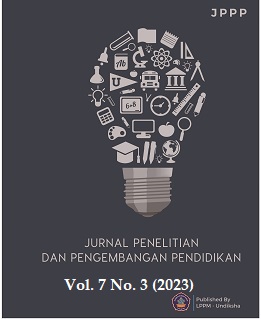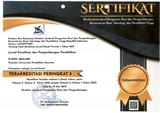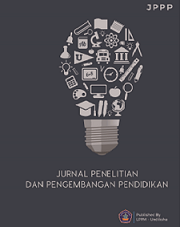School Effectiveness: Institutional Benchmarking for Vocational High School Management
DOI:
https://doi.org/10.23887/jppp.v7i3.57587Keywords:
Benchmarking, Life Skill, School Effectiveness, Vocational SchoolAbstract
The disruption era presents a challenge for schools in the form of educational graduate standards in comparison to industry and the workforce. The government responded by instituting a policy of vocational schools to produce superior human resources. The adaptive strategy implemented is one of long-term quality improvement through the measurement of organizational performance using benchmarking models. The study aims to analyze the effectiveness of benchmarking techniques in improving educational services in Public Vocational High School. The research is qualitative in nature, employing case study techniques. The veracity of the data is checked using sources of principals, school public relation, and senior teacher. Data triangulation techniques and peer discussion were used to examining the data. The study's findings demonstrate technical benchmarking implementation through planning, analysis, integration, implementation, and maturity is known as institutionalist benchmarking. Benchmarking strategies for sustainable organizations are implemented concurrently through vision adaptation, mission and objectives toward strategic environments; benchmarking targeting focus determination, and goal determination through the fabric of school superior partnerships. Adaptation of the benchmarking outcomes program results in actualizing educational information system management, peer tutoring techniques, optimization of research activities, and strengthening internal supervision. In addition, interviews are the only method used to collect data for this study. Therefore, future research will investigate the school institution of others in Indonesia, particularly the development of vocational schools that have already integrated science and skill competencies.
References
Acevedo-De-los-Ríos, A., Rondinel-Oviedo, D. R., & .. (2021). Impact, Added Value and Relevance of an Accreditation Process on Quality Assurance in Architectural Higher Education. Quality in Higher Education, 1–19. https://doi.org/10.1080/13538322.2021.1977482. DOI: https://doi.org/10.1080/13538322.2021.1977482
Antasari, R. R. (2021). Analisis Penggunaan Benchmarking untuk Meningkatkan Mutu Keungulan Bersaing antara Rumah Jurnal di Lingkuan Perguruan Tinggi Keagamaan Islam Negri (PTKIN). Rajagrafindo Persada (Rajawali Pers).
Arifin, I., Juharyanto, Mustiningsih, & Taufiq, A. (2018). Islamic Crash Course as a Leadership Strategy of School Principals in Strengthening School Organizational Culture. SAGE Open, 8(3), 215824401879984. https://doi.org/10.1177/2158244018799849. DOI: https://doi.org/10.1177/2158244018799849
Astuti, M., Arifin, Z., Mutohhari, F., & Nurtanto, M. (2021). Competency of Digital Technology: The Maturity Levels of Teachers and Students in Vocational Education in Indonesia. Journal of Education Technology, 5(2), 254–262. https://doi.org/10.23887/jet.v5i3.35108. DOI: https://doi.org/10.23887/jet.v5i3.35108
Baker, K. H. (2004). A Comparison of Students’ Achievement and Attitudes between Constructivist and Traditional Classroom Environments in Thailand Vocational Electronics. Programs King Mongkut’s Institute of Technology, 29(2), 133–153. https://doi.org/10.5328/JVER29.2.133. DOI: https://doi.org/10.5328/JVER29.2.133
Bogetoft, P. (2013). Performance Benchmarking: Measuring and Managing Performance. Springer Science & Business Media. DOI: https://doi.org/10.1007/978-1-4614-6043-5
Caleb, E. E., Usoro, A. D., Onweh, V. E., & Akpan, G. A. (2017). Benchmarking Technical Vocational Education and Training in Nigeria for adaptation to Industry Skills Demand: a Needs Assessment Study. International Journal of Educational Benchmark, 6(2), 44–64. https://www.researchgate.net/profile/Emmanuel-Caleb-2/publication/369197403. DOI: https://doi.org/10.2139/ssrn.4166864
Carayannis, E. G. (2020). Benchmarking. In Encyclopedia of Creativity, Invention, Innovation and Entrepreneurship (pp. 201–201). Springer International Publishing. https://doi.org/10.1007/978-3-319-15347-6_300091. DOI: https://doi.org/10.1007/978-3-319-15347-6_300091
Elkington, R., Van der Steege, M., Glick-Smith, J., & Breen, J. M. (2017). Visionary Leadership in a Turbulent World: Thriving in the New VUCA Context. Emerald Group Publishing. DOI: https://doi.org/10.1108/9781787142428
Emzir, M. (2013). Metodologi Penelitian Pendidikan: Kuantitatif dan Kualitatif. Jakarta: Rajawali Pers.
Fang, Z., Chang, B., & Dang, J. (2022). Growth Mindset Matters: Influences of Socioeconomic status on Chinese Secondary Vocational Students’ Learning Engagement. Journal of Pacific Rim Psychology, 16, 183449092211419. https://doi.org/10.1177/18344909221141984. DOI: https://doi.org/10.1177/18344909221141984
Faturohman, N., & Suherman, S. (2022). The Pattern of Vocational School Partnership with Industry and the World of Work (IDUKA) In Order to Increase the Absorption Of Graduates of Setiabudhi Vocational School Rangkasbitung. Journal of Positive School Psychology, 6(5), 5191–5197. https://journalppw.com/index.php/jpsp/article/view/7498.
Glewwe, P., Shen, R., Sun, B., & Wisniewski, S. (2020). Teachers in Developing Countries. In The Economics of Education (pp. 371–389). Elsevier. https://doi.org/10.1016/B978-0-12-815391-8.00027-6. DOI: https://doi.org/10.1016/B978-0-12-815391-8.00027-6
Gunasekaran, A. (2021). Benchmarking Tools and Practices for Twenty-First Century Competitiveness. Benchmarking: An International Journal, 8(2). https://doi.org/10.1108/bij.2001.13108baa.001. DOI: https://doi.org/10.1108/bij.2001.13108baa.001
Ismara, K. I., & Prianto, E. (2020). Safety education management in welding robotic laboratory. Journal of Physics: Conference Series, 1446(1). https://doi.org/10.1088/1742-6596/1446/1/012061. DOI: https://doi.org/10.1088/1742-6596/1446/1/012061
Johnston, N. (2020). The Shift towards Digital Literacy in Australian University Libraries: Developing a Digital Literacy Framework. Journal of the Australian Library and Information Association, 69(1), 93–101. https://doi.org/10.1080/24750158.2020.1712638. DOI: https://doi.org/10.1080/24750158.2020.1712638
Juharyanto, J., Arifin, I., Sultoni, S., Adha, M. A., & Qureshi, M. I. (2023). Antecedents of Primary School Quality: The Case of Remote Areas Schools in Indonesia. SAGE Open, 13(1), 215824402211449. https://doi.org/10.1177/21582440221144971. DOI: https://doi.org/10.1177/21582440221144971
Kartikasari, E., & Nuryasana, E. (2022). School literacy movement program in elementary school, Indonesia: Literature review. Journal of Education and Learning (EduLearn), 16(3), 336–341. https://doi.org/10.11591/edulearn.v16i3.20383. DOI: https://doi.org/10.11591/edulearn.v16i3.20383
Kimberly, J. R., & Bouchikhi, H. (2016). Disruption on Steroids: Sea Change in the Worlds of Higher Education in General and Business Education in Particular. Journal of Leadership & Organizational Studies, 23(1), 5–12. https://doi.org/10.1177/1548051815606434. DOI: https://doi.org/10.1177/1548051815606434
Komatsu, H., Fu, S.-P., Lin, M.-H., Hsieh, Y.-H., Rappleye, J., & Silova, I. (2022). Measuring the Transformation of University Students’ Self-Construal for Greater Environmental Sustainability. SAGE Open, 12(1), 215824402210798. https://doi.org/10.1177/21582440221079836. DOI: https://doi.org/10.1177/21582440221079836
Kushnir, I., Nunes, A., & ... (2022). Education and the UN Development Goals Projects (MDGs and SDGs): Definitions, Links, Operationalisations. Journal of Research in International Education, 21(1), 3–21. https://doi.org/10.1177/14752409221088942. DOI: https://doi.org/10.1177/14752409221088942
Liu, R. (2021). Disparities in Disruptions to Postsecondary Education Plans During the COVID-19 Pandemic. AERA Open, 7, 233285842110454. https://doi.org/10.1177/23328584211045400. DOI: https://doi.org/10.1177/23328584211045400
Lubis, A. (2016). Peningkatan Kinerja Melalui Strategi Benchmarking. At-Tijaroh: Jurnal Ilmu Manajemen Dan Bisnis Islam, 2(1), 14–26. https://doi.org/10.56403/nejesh.v2i3.126. DOI: https://doi.org/10.56403/nejesh.v2i3.126
Lumban Gaol, N. T. (2021). School Leadership in Indonesia: A Systematic Literature Review. Educational Management Administration & Leadership, 174114322110108. https://doi.org/10.1177/17411432211010811. DOI: https://doi.org/10.1177/17411432211010811
Marquez, J., Lambert, L., Ridge, N. Y., & Walker, S. (2022). The PISA Performance Gap Between National and Expatriate Students in the United Arab Emirates. Journal of Research in International Education, 21(1), 22–45. https://doi.org/10.1177/14752409221090440. DOI: https://doi.org/10.1177/14752409221090440
Miles, M. B., Huberman, A. M., & Saldaña, J. (2018). Qualitative data analysis: A methods sourcebook. Sage Publications.
Misbah, Z., Gulikers, J., Dharma, S., & Mulder, M. (2020). Evaluating competence-based vocational education in Indonesia. Journal of Vocational Education and Training, 72(4), 488–515. https://doi.org/10.1080/13636820.2019.1635634. DOI: https://doi.org/10.1080/13636820.2019.1635634
Mutohhari, F., Sutiman, S., Nurtanto, M., Kholifah, N., & Samsudin, A. (2021). Difficulties in implementing 21st century skills competence in vocational education learning. International Journal of Evaluation and Research in Education, 10(4), 1229–1236. https://doi.org/10.11591/ijere.v10i4.22028. DOI: https://doi.org/10.11591/ijere.v10i4.22028
Nimehchisalem, V., Hosseini, M., Cortazzi, M., & Jin, L. (2023). Multiple Perspectives of Stakeholders towards Young Learners’ Language Assessment in an International School in Malaysia. Language Teaching Research, 136216882311544. https://doi.org/10.1177/13621688231154440. DOI: https://doi.org/10.1177/13621688231154440
Pambayun, N. A. Y., Sofyan, H., & Haryana, K. (2020). Vocational high school infrastructure conditions and the challenges in facing the era of literation and industrial revolution 4.0. Journal of Physics: Conference Series, 1700(1), 0–8. https://doi.org/10.1088/1742-6596/1700/1/012068. DOI: https://doi.org/10.1088/1742-6596/1700/1/012068
Pino-Mejías, J.-L., Luque-Calvo, P.-L., & ... (2021). Survey of Methods for Ranking and Benchmarking Higher Education Institutions. In Handbook of Operations Research and Management Science in Higher Education (pp. 159–211). https://doi.org/10.1007/978-3-030-74051-1_6. DOI: https://doi.org/10.1007/978-3-030-74051-1_6
Popoola, G. A., Amoo, O. K., Umar, O. G., Popoola, A. A., & Olatunji, O. M. (2020). Influence of reading habit on student academic performance in a senior second school in Ibadan. Multifaceted Strategies for Social-Emotional Learning and Whole Learner Education, 141–162. https://doi.org/10.4018/978-1-7998-4906-3.ch007. DOI: https://doi.org/10.4018/978-1-7998-4906-3.ch007
Portuguez Castro, M., Ross Scheede, C., & Gómez Zermeño, M. G. (2019). The Impact of Higher Education on Entrepreneurship and the Innovation Ecosystem: A Case Study in Mexico. Sustainability, 11(20), 5597. https://doi.org/10.3390/su11205597. DOI: https://doi.org/10.3390/su11205597
Prasetyo, M. A. M., Anwar, K., Asvio, N., & M, Z. (2022). Dimensional Analysis of School Based Pesantren Design Development. Jurnal Iqra’: Kajian Ilmu Pendidikan, 7(1), 1–13. https://doi.org/10.25217/ji.v7i1.1636. DOI: https://doi.org/10.25217/ji.v7i1.1636
Rahmah, S., & Prasetyo, M. A. M. (2022). Quality Islamic Boarding School Model: Linking the Principles of Teacher Professionalism and Organizational Management. AL-HAYAT: Journal Of Islamic Education, 6(2), 161–173. https://doi.org/https://doi.org/10.35723/ajie.v6i2.249. DOI: https://doi.org/10.35723/ajie.v6i2.249
Reese, S. (2018). Unlearning and the Learning Organization: Revisited and Expanded. The Learning Organization, 25(3), 210–212. https://doi.org/10.1108/TLO-01-2018-0013. DOI: https://doi.org/10.1108/TLO-01-2018-0013
Rizal, S. (2019). Humas dalam Perspektif Manajemen Pendidikan Islam. Idarah (Jurnal Pendidikan Dan Kependidikan), 3(1), 16–36. https://doi.org/10.47766/idarah.v3i1.610. DOI: https://doi.org/10.47766/idarah.v3i1.610
Sartika, D., Nengsi, A. R., & ... (2022). Work Readiness of Graduates Responding to User Needs for a “Ready to Work” Workforce from University Perspective. Idarah (Jurnal Pendidikan Dan Kependidikan), 6(1), 37–50. https://doi.org/10.47766/idarah.v6i1.490. DOI: https://doi.org/10.47766/idarah.v6i1.490
Shrivastava, U., & Acharya, S. R. (2021). Entrepreneurship Education Intention and Entrepreneurial Intention amongst Disadvantaged Students: an Empirical Study. Journal of Enterprising Communities: People and Places in the Global Economy, 15(3), 313–333. https://doi.org/10.1108/JEC-04-2020-0072. DOI: https://doi.org/10.1108/JEC-04-2020-0072
Singhania, M., Saini, N., & ... (2022). Quantification of ESG Regulations: A Cross-Country Benchmarking Analysis. Vision: The Journal of Business Perspective, 26(2), 163–171. https://doi.org/10.1177/09722629211054173. DOI: https://doi.org/10.1177/09722629211054173
Siregar, F. A., & Prasetyo, M. A. M. (2023). The Innovation of Pesantren Development in Aceh Province through the Effectiveness of Organizational Culture. Jurnal Kependidikan: Jurnal Hasil Penelitian Dan Kajian Kepustakaan Di Bidang Pendidikan, Pengajaran Dan Pembelajaran, 9(1), 174. https://doi.org/10.33394/jk.v9i1.5735. DOI: https://doi.org/10.33394/jk.v9i1.5735
Stadler, A., & Smith, A. M. J. (2017). Entrepreneurship in Vocational Education. Industry and Higher Education, 31(2), 81–89. https://doi.org/10.1177/0950422217693963. DOI: https://doi.org/10.1177/0950422217693963
Suryawati, E., & Osman, K. (2018). Contextual learning: Innovative approach towards the development of students’ scientific attitude and natural science performance. Eurasia Journal of Mathematics, Science and Technology Education, 14(1), 61–76. https://doi.org/10.12973/ejmste/79329. DOI: https://doi.org/10.12973/ejmste/79329
Syapsan. (2019). The Effect of Service Quality, Innovation Towards Competitive Advantages and Sustainable Economic Growth. Benchmarking: An International Journal, 26(4), 1336–1356. https://doi.org/10.1108/BIJ-10-2017-0280. DOI: https://doi.org/10.1108/BIJ-10-2017-0280
Yanto, D. T. P., Kabatiah, M., Zaswita, H., Giatman, G., & Effendi, H. (2022). Development of Virtual Learning using Problem-Based Learning Models for Vocational Education Students. Elinvo (Electronics, Informatics, and Vocational Education), 7(2), 163–172. https://doi.org/10.21831/elinvo.v7i2.52473. DOI: https://doi.org/10.21831/elinvo.v7i2.52473
Downloads
Published
How to Cite
Issue
Section
License
Copyright (c) 2023 Muhammad Anggung Manumanoso Prasetyo, Agus Salim Salabi

This work is licensed under a Creative Commons Attribution-ShareAlike 4.0 International License.
Authors who publish with the Jurnal Penelitian dan Pengembangan Pendidikan agree to the following terms:
- Authors retain copyright and grant the journal the right of first publication with the work simultaneously licensed under a Creative Commons Attribution License (CC BY-SA 4.0) that allows others to share the work with an acknowledgment of the work's authorship and initial publication in this journal.
- Authors are able to enter into separate, additional contractual arrangements for the non-exclusive distribution of the journal's published version of the work (e.g., post it to an institutional repository or publish it in a book), with an acknowledgment of its initial publication in this journal.
- Authors are permitted and encouraged to post their work online (e.g., in institutional repositories or on their website) prior to and during the submission process, as it can lead to productive exchanges, as well as earlier and greater citation of published work. (See The Effect of Open Access)








